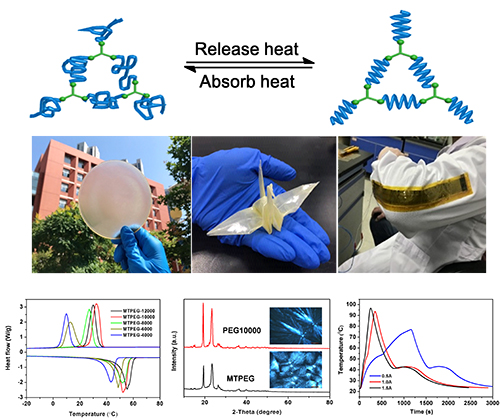Phase change materials (PCMs) involving significant amounts of latent heat absorbing and releasing at a constant transition temperature have been utilized for thermal management of electronic devices. However, it is a challenge to apply thermal management for wearable devices using traditional PCMs due to their solid rigidity and liquid leakage.
Recently, a research group led by Prof. SHI Quan from the Dalian Institute of Chemical Physics (DICP) of the Chinese Academy of Science (CAS), in collaboration with Prof. WU zhongshuai from the DICP, developed an intrinsically flexible phase change film by a facile synthetic strategy, and integrated it into wearable devices with a flexible graphene film.
This work was published in Energy Storage Materials on October 17.

An intrinsically flexible phase change film with remarkable shape tailorability and foldability exhibits superior performance in wearable thermal managements (Image by KOU Yan and SUN Keyan)
This PCM film showed adjustable phase transition enthalpy and temperature in the region from 5 to 60 °C, as well as long-term cycling stability up to 1000 cycles. Furthermore, it could be easily integrted into wearable thermal management devices with a flexible graphene film, due to the features of intrinsic flexibility, self-support and shape-conformable property, as well as remarkable shape tailorability and foldability.
This device exhibited stable temperature control performance at different device shapes and temperatures, and the highest electro-thermal energy conversion efficiency could reach to 94%.
Scientists had sewed this temperature control device on a lab coat, which behaved excellent flexibility and shape-conformability in the bending action process.
This work is potential for next-generation flexible thermal management electronics.
This work was supported by the DICP Innovation Funding and the National Natural Science Foundation of China. (Text by KOU Yan and SUN Keyan)